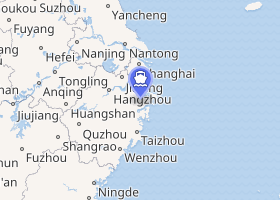Port of Ningbo-Zhoushan
The Port of Ningbo-Zhoushan is a port that is the busiest in the world in terms of cargo tonnage. It handled 888.96 million tons of cargo in 2015.[1] The port is located in Ningbo and Zhoushan, on the coast of the East China Sea, in Zhejiang province on the southeast end of Hangzhou Bay, across which it faces the municipality of Shanghai.[2]
| Port of Ningbo-Zhoushan 宁波舟山港 | |
|---|---|

| |
| Location | |
| Country | China |
| Location | Ningbo & Zhoushan, Zhejiang |
| Coordinates | 29°52′N 121°33′E |
| Details | |
| Owned by | Ningbo Zhoushan Port Co., Ltd. (SSE: 601018) |
| Statistics | |
| Annual cargo tonnage | 744 million (2012) |
| Annual container volume | 16.83 million (2012) |
| Port of Ningbo-Zhoushan | |||||||||||
|---|---|---|---|---|---|---|---|---|---|---|---|
| Simplified Chinese | 宁波舟山港 | ||||||||||
| Traditional Chinese | 寧波舟山港 | ||||||||||
| |||||||||||
The port is at the crossroads of the north-south inland and coastal shipping route, including canals to the important inland waterway to interior China, the Yangtze River, to the north. The port consists of several ports which are Beilun (seaport), Zhenhai (estuary port), and old Ningbo harbor (inland river port).
The operator of the port, Ningbo Zhoushan Port Co., Ltd. (NZP), is a listed company, but it is 76.31% owned by state-owned Ningbo Zhoushan Port Group Co., Ltd., as of 30 June 2017.
History
Ningbo Port was established in 738 during China's ancient history. During the Tang Dynasty (618-907), it was known as one of the three major seaports for foreign trade under the name "Mingzhou", along with Yangzhou and Guangzhou.[3]
In the Song Dynasty, it became one of the three major port cities for foreign trade, together with Guangzhou and Quanzhou.[3] It was designated as one of the "Five Treaty Ports" along with Guangzhou, Xiamen, Fuzhou and Shanghai after the 1842 Treaty of Nanking that ended the First Opium War.[4]
In 2006, the Port of Ningbo was merged with the neighboring Port of Zhoushan to form a combined cargo handling center. The combined Ningbo-Zhoushan Port handled a total cargo volume of 744,000,000 metric tons of cargo in 2012,[5] making it the largest port in the world in terms of cargo tonnage, surpassing the Port of Shanghai for the first time.
Economic trade
The Port of Ningbo-Zhoushan is involved in economic trade with cargo shipment, raw materials and manufactured goods from as far as North and South America and Oceania. It has economic trade with over 560 ports from more than 90 countries and regions in the world.[6][7] It is one of a growing number of ports in China with a cargo throughput volume exceeding 100 million tons annually.[6]
The water quality within Ningbo-Zhoushan Port has become badly polluted over the past ten years, due to the massive scale of maritime traffic constantly in operation.[4]
Port infrastructure
The Port of Ningbo-Zhoushan complex is a modern multi-purpose deep water port, consisting of inland, estuary, and coastal harbors.[8] There are a total of 191 berths including 39 deep water berths with 10,000 and more tonnage.[8]
The larger ports include a 250,000 tonnage crude oil terminal and a 200,000+ tonnage ore loading berth.[8] There is also a purpose-built terminal for 6th generation container vessels and a 50,000 tonnage berth dedicated for liquid chemical products.[6]
References
- 2015年全球十大港口货物吞吐量统计排名表_港口吞吐量_海事服务网CNSS. www.cnss.com.cn. Archived from the original on 26 April 2018. Retrieved 26 April 2018.
- "Port of NINGBO- ShippingOnline.cn". www.shippingonline.cn. Archived from the original on 7 July 2011. Retrieved 26 April 2018.
- "Archived copy". Archived from the original on 2009-12-12. Retrieved 2010-06-28.CS1 maint: archived copy as title (link)
- http://www.nbwh.gov.cn/homepage/specialty/civc/english_add_1.phpid=1126590263&theme=546&uptheme=true%5B%5D
- 2012-12全国货物、集装箱、旅客吞吐量统计_港口业务_中国港口网. www.chinaports.com. Archived from the original on 30 June 2017. Retrieved 26 April 2018.
- 宁波舟山港门户. www.nbport.com.cn. Archived from the original on 19 July 2017. Retrieved 26 April 2018.
- "Archived copy". Archived from the original on 2011-07-17. Retrieved 2010-06-28.CS1 maint: archived copy as title (link)
- "Archived copy". Archived from the original on 2010-07-15. Retrieved 2010-06-28.CS1 maint: archived copy as title (link)